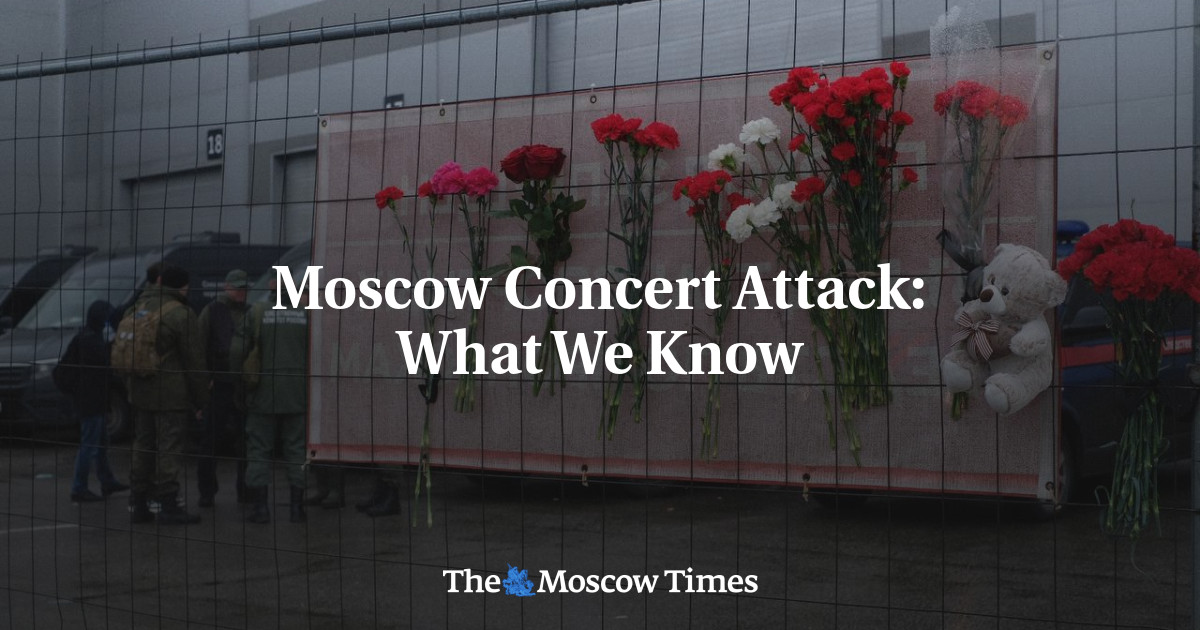
An attack by gunmen on a Moscow suburban concert hall Friday left at least 133 dead, according to Russian authorities.
Here is what we know about the attack on the Crocus City Hall in Krasnogorsk ahead of a concert by the Piknik rock band:
Attackers in ‘tactical uniforms’
The attack began around 8:15 pm before the start of a concert by the popular Soviet-era band.
The gunmen used automatic weapons and set fire to the venue with flammable liquid, according to investigators.
Emergency services quoted by the Interfax news agency said between two and five armed attackers dressed in “tactical uniforms” and carrying automatic weapons entered the concert hall and opened fire.
Russian social media channels close to the security services showed videos of at least two men walking into the hall. Others showed bodies and groups of screaming people rushing towards exits.
Scores of people hid in the hall or rushed towards entrances to the basement or roof to escape the bullets.
An AFP journalist at the scene hours after the attack saw black smoke and flames coming from the roof of the concert hall, which can hold up to 6,000 people. Media said part of the roof had collapsed.
Toll
At least 133 people were killed and the death toll is expected to rise with searches through the rubble due to last for several days.
“While clearing the debris in the Crocus City Hall concert hall, the number killed as a result of the terrorist attack rose to 133 people. Search operations are continuing,” Russia’s Investigative Committee, which probes major crimes, said in a statement.
According to the emergency situations ministry, about 100 people were still in hospital on Saturday.
It said fire services helped about 100 people escape through the basement of the concert hall.
TASS news agency said that all of the Piknik band had been evacuated safely.
Rescue operations were also launched for people trapped on the roof.
IS claims responsibility
The Islamic State group claimed responsibility on Friday, saying its fighters attacked “a large gathering” on Moscow’s outskirts and “retreated to their bases safely.”
The Kremlin said 11 people, including the four assailants, had been arrested. Russia’s FSB security service said some of the perpetrators had fled towards the Russia-Ukraine border, adding that the assailants had “appropriate contacts” in the country.
Ukraine meanwhile accused the Kremlin and its services of orchestrating the attack and justifying an escalation in the war.
The Ukrainian Foreign Ministry said accusations against the country were “a planned provocation by the Kremlin to further fuel anti-Ukrainian hysteria in Russian society.”
Former president Dmitriy Medvedev said Moscow would “destroy” Ukrainian leaders if they were found to be involved.
Warnings
The U.S. Embassy had said two weeks before the attack that there was a risk of “extremists” targeting mass gatherings in Moscow, including concerts.
“If the United States had reliable information on this, it should have immediately transmitted it,” said Russian Foreign Ministry spokeswoman Maria Zakharova, calling Friday’s attack a “monstrous crime.”
Russian authorities had announced on March 3 that six suspected Islamic State fighters had been killed in an operation in Ingushetia, a small Muslim-majority republic in the Caucasus region.
Russia has been the target of past attacks by Islamic militants, but also mass killings with no clear political link.
In 2002, Chechen separatist fighters took 912 people hostage in a Moscow theatre, the Dubrovka, demanding the withdrawal of Russian troops from the Caucasus republic.
Special forces attacked the theatre to end the hostage-taking and 130 people were killed, nearly all suffocated by a gas used by security forces to knock out the gunmen.
… we have a small favor to ask.
As you may have heard, The Moscow Times, an independent news source for over 30 years, has been unjustly branded as a “foreign agent” by the Russian government. This blatant attempt to silence our voice is a direct assault on the integrity of journalism and the values we hold dear.
We, the journalists of The Moscow Times, refuse to be silenced. Our commitment to providing accurate and unbiased reporting on Russia remains unshaken. But we need your help to continue our critical mission.
It’s quick to set up, and you can be confident that you’re making a significant impact every month by supporting open, independent journalism. Thank you.